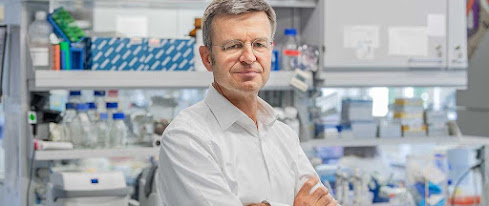 |
| Prof. Stefan Engelhardt and startup rnatics develop an RNA-based drug that can prevent inflammatory lung conditions associated with Covid-19. Image Credit: Andreas Heddergott / TUM |
rnatics, a startup at the Technical University of Munich (TUM), has created an RNA-based drug to prevent lung damage from infections as seen in serious Covid-19 cases. The Federal Ministry of Education and Research (BMBF) is providing 7 million euros in funding to support the development of the drug. The team is using a substance that inhibits the inflammation-promoting microRNA. The therapy is expected to be efficacious in current and future mutations of SARS-CoV2.
Covid-19 infections can lead to serious inflammations of the lung and the formation of scar tissue (fibrosis). This can have a long-term impact on lung function and is one of the causes of “long covid”. A team working with Stefan Engelhardt, Professor of Pharmacology and Toxicology at TUM has developed a new RNA-based drug that can prevent these inflammatory lung conditions. When administered via the respiratory passages, it quickly targets immune cells in the alveoli (tiny air sacs in the lungs) and inhibits a microRNA molecule found in these cells.
In Covid patients, misguided immune cells called macrophages play a substantial role in severe inflammatory infections and lung damage. However, when the new drug blocked the microRNA molecule in macrophages in mice, there was a significant reduction in inflammation and lung damage and a considerable improvement in lung function. Stefan Engelhardt is confident that serious infections and thus the kind of lung damage associated with long covid can be prevented in human patients receiving the drug through an inhaler.
Starting with RCS-21, a sugar-coupled oligonucleotide inhibitor, Engelhardt and his partners are developing a drug to treat Covid-19 infections. The RNA drug would be the first in its class for targeted delivery to macrophages. “Because it influences immune cells, and not the virus itself, RCS-21 should also be effective in fighting omicron infections or even more aggressive variants arising in the future,” says Deepak Ramanujam, co-inventor and a group leader at TUM’s Institute of Pharmacology and Toxicology. A global patent process is underway. The Federal Ministry of Education and Research (BMBF) will provide 7 million euros in funding under the “Directive to support research and development for urgently needed treatments for SARS-CoV-2”.
The Federal Institute for Drugs and Medical Devices (BfArM) issued a positive assessment of RCS-21 in an advice meeting. This is an important prerequisite for the further development of a drug. “We expect to complete the pre-clinical toxicological assessment in the third quarter of 2022. We then plan to enter phase one of the clinical assessment in about a year,” says Stefan Engelhardt. In the first of three clinical trial phases before final approval, a drug is initially administered to a small group of individuals.
With the support of the TUM Venture Labs Healthcare, the rnatics startup was launched in record time and was able to meet the prerequisites to develop a new treatment. The co-founders are the experienced biotechnology entrepreneur and investor Dr. Thomas Frischmuth and Prof. Klaus Rabe, the director of LungenClinic Hamburg/Grosshansdorf and an expert in developing treatments for lung diseases. The Bavarian research company ISAR Bioscience GmbH will also participate in the development of RCS-21.
The TUM Venture Labs are a unique Europe-wide initiative for research-based start-ups. Their objectives are to greatly accelerate the conversion of leading-edge research into market-ready applications, make Munich the leading European hub for deep tech innovations and thus to boost Europe’s technological sovereignty. TUM Venture Labs offer tailor-made support concepts, incubator spaces, labs and technical infrastructure, training and venturing programs. Teams also gain access to a global network of companies and investors.
Source/Credit: Technical University of Munich
med011422_01







.jpg)